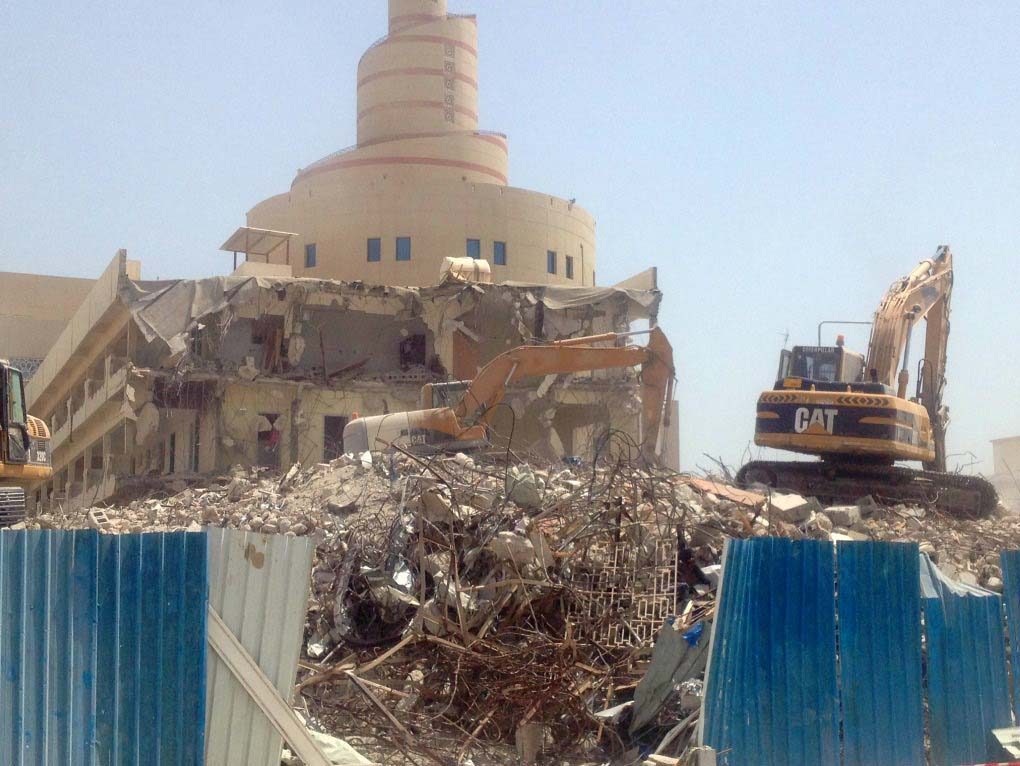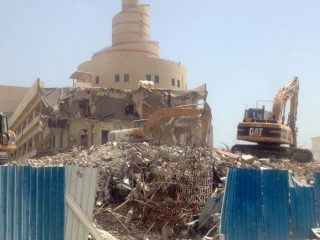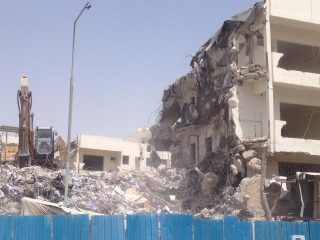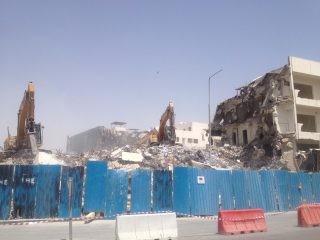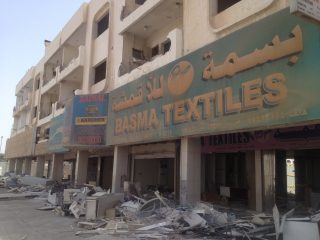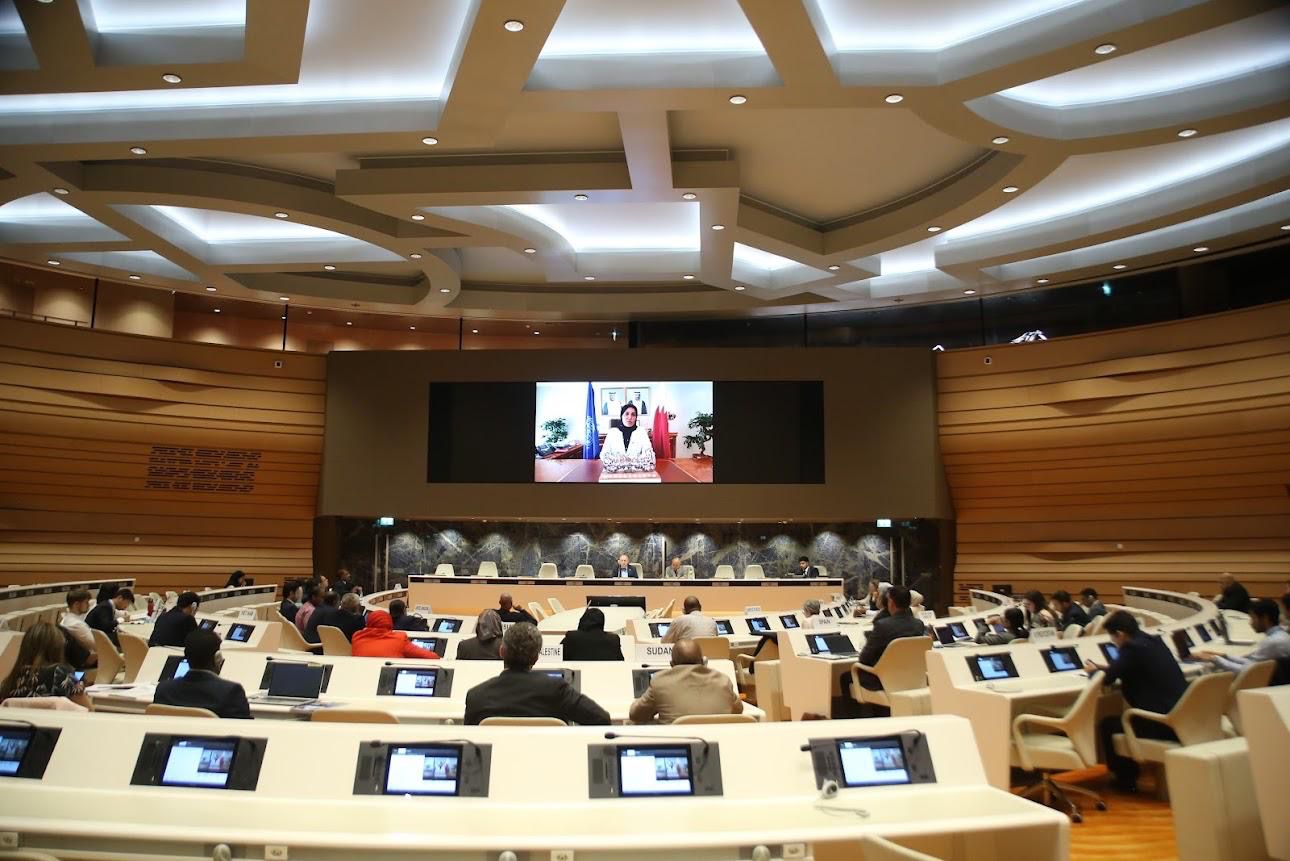All photos by Lesley Walker
As part of plans to redevelop Doha’s old downtown, demolition has begun on Souq Ahmed Bin Ali, with neighboring souqs facing permanent closure by the end of the year.
Much of Souq Ahmed, which is located behind the Fanar Cultural Center and opened in the late 1980s, has already been bulldozed, with several diggers breaking down remaining sections this week.
According to developers UrbaCon Trading & Contracting (UCC), a hotel will be built on the site. A pedestrian tunnel is also in the works under Bank St., leading from the old souq area to the popular Souq Waqif.
The tunnel is set to open by the end of the year, UCC said in a statement to Doha News, adding that it is currently drawing up the design concepts for a boutique hotel on the old souq site.
Souq Ahmed demolition
For the past few decades, Souq Ahmed hosted some 50 small stores that sold lower-priced bed linens, clothing and household goods. It was also home to several money exchanges and cafes.
The area was popular with Qataris and residents from Asian countries because the stores often offered discounts on their goods.

Staff at the shops there previously told Doha News that they were informed by text message in February this year that they would soon be forced to close, and that the site would be razed.
In March, after their electricity was cut off, some stores continued to operate by candlelight while clearing existing stock.
Many owners and managers said they had already secured new premises in other residential districts in Doha such as Muaither, Muntaza and Abu Hamour, as well as further out of town in Mesaimeer.
Other souqs
Meanwhile, it appears that adjacent commercial complexes on the street will also not be open for much longer.
Speaking to Doha News this week, store employees and managers said they have been told they have between three to six months left to operate before they are closed.
A staffer at Hollywood Perfumes in Souq Faleh said the owner of his store was currently looking for an alternative site as they were in their final months of being allowed to operate.
According to Nazmul Sarker, a salesman at Al Jawal Abaya in Souq Faleh, the government had taken over the leases on the stores in the area in November 2014 and at that time gave the shops a year’s notice to leave their current premises.

Sarker said the owner of the store was already looking for a new site in a neighborhood popular with Qatari families, although had not confirmed the location yet.
The story was similar further down the road, in shops in Souq Al Asiri. A salesman in Pinoy Sports said he believed the shop would be closing in around three months.
Staff in some of the popular material shops in Souq Al Deira, opposite Al Rawnaq, said they had been granted permission to operate a little longer. One salesman said he understood the busy souq would likely not be closed for another two years.
Other commercial centers in the area such as Souq Al Jaber have also been earmarked for closure, having already been served with eviction notices from the Ministry of Municipality and Urban Planning (MMUP/Baladiya).
Stores that have been operating on Ras Abu Aboud Street for 20 years and more are also closing, as are shops around Dar Al Khuttub roundabout, to make way for more modern developments as well as Qatar Rail stations and track.

The Old Ghanim area was once the bustling heart of Doha, with hundreds of small stores selling everything residents could need, as well as offices, banks and eating establishments.
But many of the buildings set to close are now decades old and are in a state of disrepair, showing peeling paint and broken concrete.
On the other side of Souq Waqif, the old shopping districts gave way years ago to the massive under-construction Msheireb development, which is set to transform the area with five-star hotels and sleek, modern retail plazas.
Meanwhile, the old Souq Najada, known as “mobile phone souq” which was closed down in 2012 and later demolished, is being rebuilt as a souq and boutique hotel, developers UCC said.

The seven-story hotel will have 126 rooms and suites, as well as two restaurants, a gym, a swimming pool and a business center.
A bookstore and a multi-story car park will also be located on the site, in addition to a two-level shopping complex, according to details on UCC’s website. The new buildings are expected to be completed by April 2016.
While some residents mourn the departure of the old souqs, others argue that the dilapidation of some of the buildings is potentially dangerous and the redevelopment is part of Doha’s ongoing reinvention over the years.
Thoughts?

